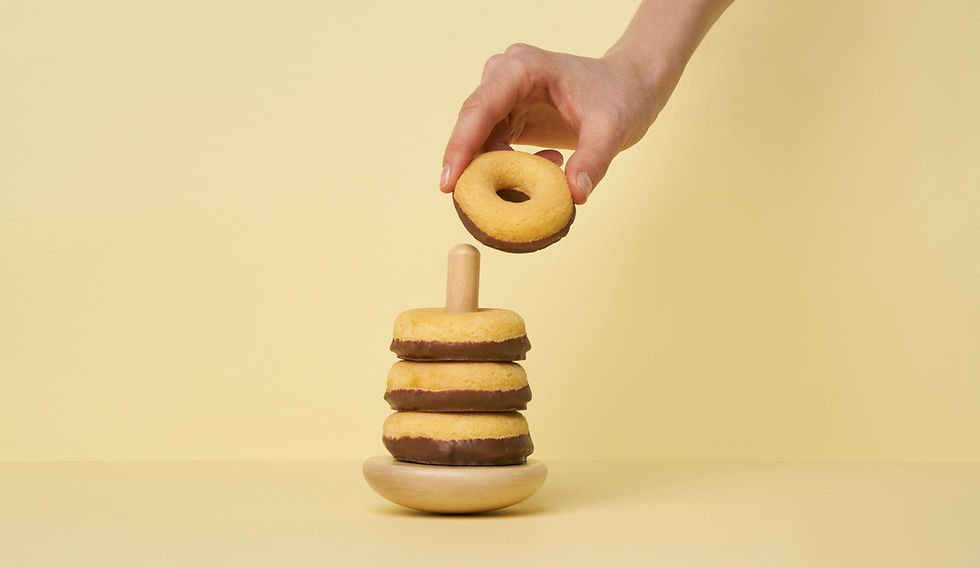Comparing Coffee Creamers so You Don't Have to
- Wendy Childs
- Mar 28
- 3 min read
Updated: Apr 1


If you love a sweet, creamy cup of coffee, you might have wondered: Is my coffee creamer a good choice? Or maybe you’re in the “I don’t care, it brings me joy” camp—no judgment either way! But if you're curious, I took a deep dive into popular liquid coffee creamers to break it all down for you.
We’re skipping the fancy lattes from Starbucks and Dunkin'—this is all about liquid coffee creamers you’d find at the grocery store. Let’s get into it!
Coffee Creamers: What’s Out There?
I looked at some of the most popular brands, including:
Traditional Creamers: Coffee Mate, International Delight, and Chobani
Plant-Based Options: Califia Farms, Coffee Mate Almond, Silk, Nut Pods, Elmhurst, and So Delicious
These all come in different flavors, but I focused on French Vanilla for consistency.
Nutrition Breakdown
Most creamers have similar calorie and fat content:
25-35 calories per tablespoon
1-1.5g fat per tablespoon
~5g sugar per tablespoon (some plant-based ones have 4g or less)
The only big outlier was French Vanilla Nut Pods, which is just 10 calories per tablespoon.
But here’s the thing—a tablespoon is tiny. If you actually measure your creamer (which, let’s be honest, most of us don’t), you’ll probably find you’re using 2-4 tablespoons per cup. That means your coffee could have 50-130 calories and around 15g of sugar, depending on what you use. If you drink multiple cups a day, that adds up fast!
What About Ingredients?
If you're concerned about additives, here’s the scoop:
Chobani has the most straightforward ingredient list—no oils, emulsifiers, or preservatives.
Plant-based creamers all had similar ingredient lists with emulsifiers and oils to help with texture.
Many creamers contain dipotassium phosphate and potassium citrate, which help balance acidity and prevent curdling when mixed with hot coffee. These ingredients are common in both dairy and non-dairy creamers to ensure a smooth texture. Elmhurst described this as a 'mineral blend' which is silly.
A lot of these creamers contain gums (like guar gum or gellan gum), but that’s not necessarily a bad thing. In dairy creamers, gums help keep the fat and liquid from separating, and in plant-based creamers, they ensure a smooth, uniform consistency. They’re naturally derived and totally fine in normal amounts.
So, What’s the Best Coffee Creamer?
It depends on what you care about!
If you want the cleanest ingredient list, Chobani is a solid pick.
If you prefer plant-based, most options are similar, but coconut-based creamers naturally contain more fat instead of added oils.
If you’re watching sugar or calories, know that most creamers are fairly similar unless you go for something like Nut Pods (10 cal/tbsp).
Personally, I keep it simple with half & half and a little sugar. My husband actually makes my coffee every morning, so I don’t have an exact count, but I’d estimate 2-3 tbsp of half & half + 1 packet of Sugar in the Raw, which comes out to 60-80 calories and ~5g sugar. Oh, and I add cinnamon! I love the simplicity of it and I haven't used a ready-made coffee creamer in years.
Final Thoughts
There’s no bad creamer, but if you’re drinking multiple cups a day, it’s worth knowing what you’re consuming. The biggest takeaway? Portion size matters—because let’s be real, nobody is stopping at one tablespoon.
What’s your go-to coffee creamer? Let me know in the comments! ☕✨



Comments